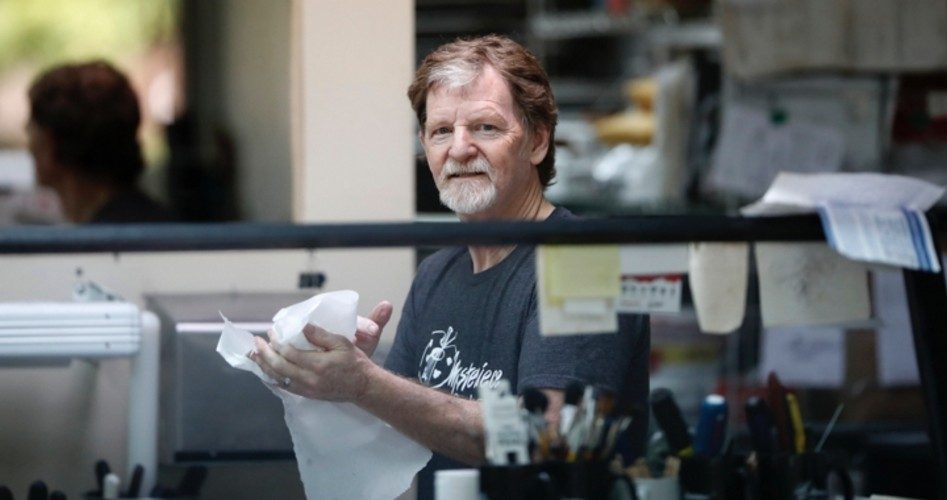
They can have their cake and eat it, too — just not if it’s decorated for a so-called “same-sex wedding.” That’s the upshot of a 7-2 Supreme Court ruling today in favor of Jack Phillips (shown), a Colorado baker persecuted by his state after refusing to craft such a cake for a pair of homosexuals.
Liberal justices Elena Kagan and Stephen Breyer and “swing vote” justice Anthony Kennedy joined the court’s four conservatives in siding with Phillips in the case, Masterpiece Cakeshop Ltd. v. Colorado Civil Rights Commission. The SCOTUS found that the commission showed a hostility toward faith and violated Phillips’ “First Amendment rights to free exercise of religion since the regulations were not applied neutrally,” as Christianity Today relates it.
That’s putting it mildly. After all, around the time of Phillips’ woes, Colorado officials had actually “protected several bakers who were charged with anti-religious discrimination when they refused to design a cake with a quote from Leviticus condemning homosexuality,” reported the Berkeley Center for Religion, Peace & World Affairs in 2017.
Phillips’ problems stemmed from a complaint (perhaps a setup) by two homosexuals named David Mullins and Charlie Craig after the baker refused their request for a faux (same-sex) wedding cake in 2012, thus becoming one of a number of Christian businessmen targeted by the sexual-devolutionary lobby.
Interestingly, Reuters called the ruling a “narrow victory” for the baker because the “court did not issue a definitive ruling on the circumstances under which people can seek exemptions from anti-discrimination laws based on their religious views,” the news organ wrote. As it explained, “‘The outcome of cases like this in other circumstances must await further elaboration in the courts, all in the context of recognizing that these disputes must be resolved with tolerance, without undue disrespect to sincere religious beliefs, and without subjecting gay persons to indignities when they seek goods and services in an open market,’ [Justice] Kennedy said.”
This is deceptive, however. While the victory for religious freedom might have been narrow, Phillips’ victory was anything but.
Nonetheless, the ruling was the narrowest of victories for common sense because the SCOTUS — and most everyone else — are missing the elephant in the room.
This obvious truth was expressed by Yale Law School professor William Eskridge, Jr., a self-described “openly gay” constitutional-law expert. Commenting on the Phillips case last year, he told the New Yorker that many Christian businessmen “have no problem with gay customers. They just don’t want to participate in the choreography of gay weddings.”
Phillips certainly fits this mold, as he told Mullins and Craig “that he would happily provide baked goods for them for other occasions, but he would not create a cake for this [faux wedding] event,” the New Yorker further informed.
“Event” is the key word. Many critics of Phillips and the SCOTUS decision complain about the baker’s refusal to “serve homosexuals.” Yet Christian businessmen don’t erect a sign stating, “No shoes, no shirt, no heterosexuality, no service” — there’s no straightness test at the door. They have not denied service to a certain type of people.
They have refused to service a certain type of event.
Thus, the proper analogy is not that Phillips’ actions are, as some aver, akin to liberals refusing to serve Christians or Trump supporters. Rather, they’re akin to blacks or Jews refusing to service, respectively, a KKK or Nazi affair.
In fact, the real question is: When before in American history has the government ever compelled a private businessman to be party to an event he found morally objectionable? When? Is this a bridge we really want to cross? Even if one were going to cite here the 14th Amendment (which would be an incorrect application), note that it guarantees equal treatment under the law only for people — not events.
So while the Colorado Civil Rights Commission had claimed “Phillips violated the Colorado anti-discrimination law that bars businesses from refusing service based on race, sex, marital status or sexual orientation,” as Reuters relates it, this is untrue. State officials clearly didn’t even know how to apply their own laws properly — or didn’t care to, in deference to their agenda.
In reality, the truth is precisely the opposite of what the sexual devolutionaries claim: Phillips did not single out homosexuals or even faux weddings. As Christianity Today reported last year, he “also refuses to create bakery goods with alcohol, and won’t make cakes ‘celebrating Halloween and other messages his faith prohibits, such as racism, atheism, and any marriage not between one man and one woman.’” The government singled out homosexual events for privileges and Christians for persecution.
Of course, none of this addresses the other room-obtruding elephant: Why should government be empowered to trample freedom of association and dictate how businessmen may discriminate in the first place? (I address this here, here, and here.) Is a person’s business his business or — in accordance with Mussolini’s fascist principle “All within the state, nothing outside the state, nothing against the state” — is “private” now just an illusion?
Photo: AP Images



